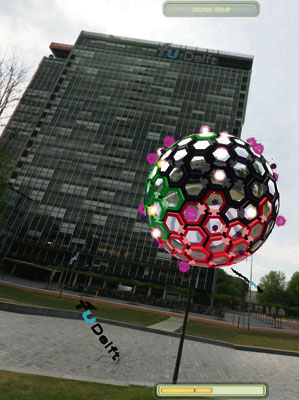Smart grid
Large-scale use of renewable energy will lead to continuously changing amounts of energy on the electricity network.
How the so-called ‘smart grids’, the intelligent electricity networks of the future, will deal with these challenges is the topic under discussion during the International Conference on Power Systems Transients, held at TU Delft from June 14-17. The event is organized by Dr Marjan Popov and Professor Lou van der Sluis of the Electrical Engineering, Mathematics and Computer Science faculty.
Antimatter
Researchers at Cern have succeeded in trapping antimatter atoms for over 16 minutes. They reported this accomplishment in the June 6th online edition of the journal Nature Physics. Sixteen minutes is long enough to begin to study their properties in detail. Ultimately the researchers want to find out why nature seems to have a preference for matter. The universe seems to be made entirely of matter, yet at the time of the Big Bang, matter and antimatter would have existed in equal quantities.
Fuel Cells
The new Solid Oxide Fuel Cell laboratory at the process and energy department (Mechanical, Maritime and Materials Engineering) is the setting for a SOFC symposium, organised by TU and KiviNiria, on 23 June. Speakers from the Netherlands and abroad will give presentations on efficient power production (by SOFC’s) in the near future. The symposium’s coordinator is Dr Aravind.
pe.tudelft.nl/~sofcpowergen2011/home.htm
,
Games project
The EWI hall buzzed with visitors, competitors and games last Friday. At the presentation of the Games Project, some 50 bachelor students presented the seven games they had been working on since last February. The jury, headed by a TU alumnus now working at Vanguard, awarded the first prize to Hexacon, a game in which players compete for tiles on a sphere. The Penguin award for the ‘most glorious failure’ went to the Cosmania team, who bit off a bit more than they could chew, but “they made a courageous attempt at the genre,” commented Dr Rafael Bidarra.
graphics.tudelft.nl/~mkt4/2011
As part of TU Delft’s introduction week for new international students, the university hosted a ‘City Rally’, a bike tour through Delft organized for the approximately five hundred new students who have recently arrived here to begin their studies. As part of the rally event, the organizers also held a photo contest, in which the students were asked to submit photos that captured their impressions of Delft. A jury then decided the winner. This year’s winning photo (above) was snapped by Azarnoush Nazari (26), from Iran, who studies architecture.
Of her photo, contest jury member Charly Verwaal said: “I love the clear, crisp quality of this image. Azarnoush spotted the contrasting graffiti and made a wonderful composition with it. This picture tells me about Holland from a different point of view.”
Smart grid
Large-scale use of renewable energy will lead to continuously changing amounts of energy on the electricity network. How the so-called ‘smart grids’, the intelligent electricity networks of the future, will deal with these challenges is the topic under discussion during the International Conference on Power Systems Transients, held at TU Delft from June 14-17. The event is organized by Dr Marjan Popov and Professor Lou van der Sluis of the Electrical Engineering, Mathematics and Computer Science faculty.
Antimatter
Researchers at Cern have succeeded in trapping antimatter atoms for over 16 minutes. They reported this accomplishment in the June 6th online edition of the journal Nature Physics. Sixteen minutes is long enough to begin to study their properties in detail. Ultimately the researchers want to find out why nature seems to have a preference for matter. The universe seems to be made entirely of matter, yet at the time of the Big Bang, matter and antimatter would have existed in equal quantities.
Fuel Cells
The new Solid Oxide Fuel Cell laboratory at the process and energy department (Mechanical, Maritime and Materials Engineering) is the setting for a SOFC symposium, organised by TU and KiviNiria, on 23 June. Speakers from the Netherlands and abroad will give presentations on efficient power production (by SOFC’s) in the near future. The symposium’s coordinator is Dr Aravind.
pe.tudelft.nl/~sofcpowergen2011/home.htm


Games project
The EWI hall buzzed with visitors, competitors and games last Friday. At the presentation of the Games Project, some 50 bachelor students presented the seven games they had been working on since last February. The jury, headed by a TU alumnus now working at Vanguard, awarded the first prize to Hexacon, a game in which players compete for tiles on a sphere. The Penguin award for the ‘most glorious failure’ went to the Cosmania team, who bit off a bit more than they could chew, but “they made a courageous attempt at the genre,” commented Dr Rafael Bidarra.


Comments are closed.